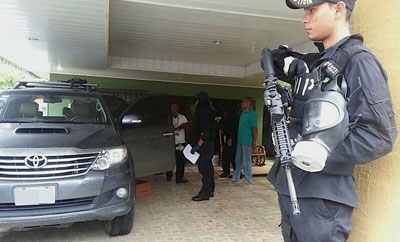Authorities in Costa Rica have dismantled a Colombia to Belgium cocaine trafficking network allegedly formed and run by Costa Rican nationals, indicating local crime is stepping up its role in trafficking as the international drug trade takes root in the country.
Costa Rica’s Drug Control Police (PCD) arrested 12 Costa Ricans, including the group’s alleged leader, on the Caribbean Coast and near the capital, San Jose, on December 17. Days earlier, Belgian authorities arrested a French person accused of involvement in the operation, reported La Nacion. Two Bank of Costa Rica (BCR) employees and two police accused of assisting operations were also arrested, reported El Guardian.
SEE ALSO: Coverage of Costa Rica
Authorities said the group, which was discovered two years ago, sent fishing boats off the coast of Limon to receive Colombian drug shipments. They then disguised the drugs among legal goods that were shipped to Belgium. The ring was allegedly responsible for 28.5 kilos of cocaine seized in Belgium in November 2011, as well as over a ton of cocaine caught off the Limon coast in May this year.
The proceeds were passed to their BCR connections, which helped to launder nearly $200,000 in drug trafficking funds, police say.
Attorney General Jorge Chavarria called the group “the most important that has been dismantled here in history.”
InSight Crime Analysis
Costa Rica has risen to become a major transport hub in recent years, as evidenced by rising cocaine seizures — 17.5 tons this year, compared with 15.5 in 2012 and 7.4 in 2011. Concurrently, various foreign groups have set up shop in Costa Rica, among them Mexico’s Knights Templar and the Revolutionary Armed Forces of Colombia (FARC).
There are signs the domestic drug trade is growing with this transnational presence, indicated by a high percentage of drug-related arrests this year, and a rising homicide rate. Costa Ricans have also been arrested for assisting Mexican cartels, showing they are involved in the transnational aspect of the trade.
The latest case indicates Costa Ricans have moved their involvement in the international cocaine trade to the next level. It provides a clear example of a Costa Rican led and financed network purchasing cocaine directly from suppliers and transporting it to one of the world’s main consumer markets.
The fact Belgium was the destination is also significant — Latin American drug traffickers are increasingly tapping into the European cocaine market, and while Spain has traditionally been the main port of entry, Belgium’s has been noted as a progressively more important portal.

